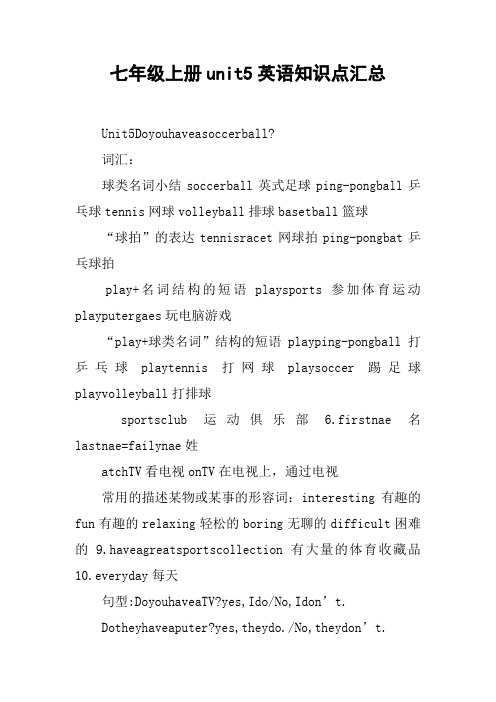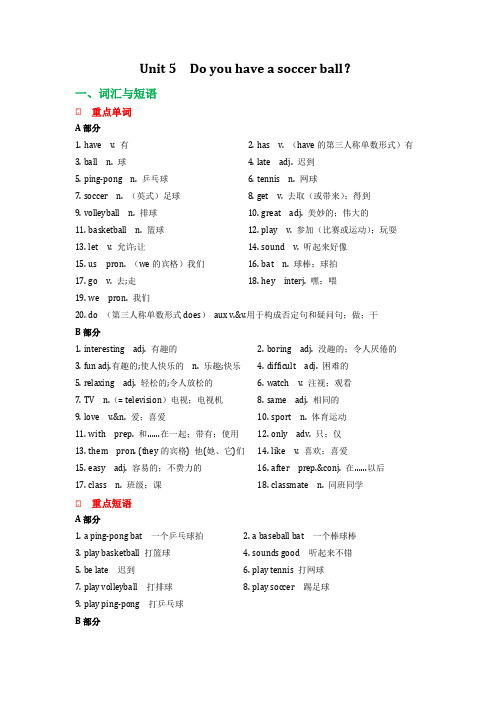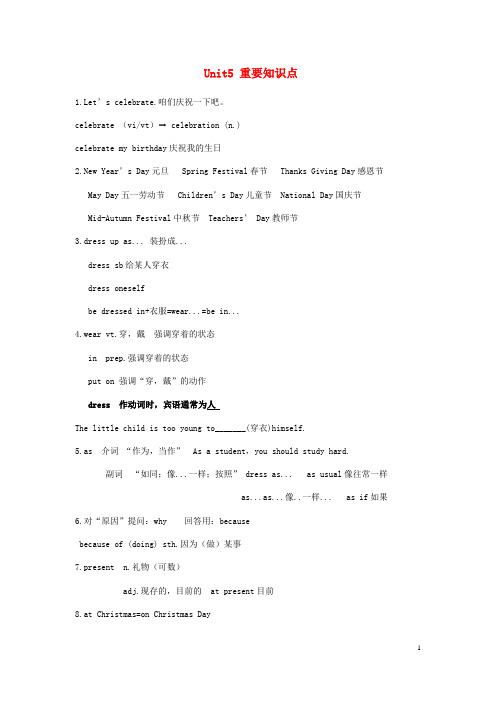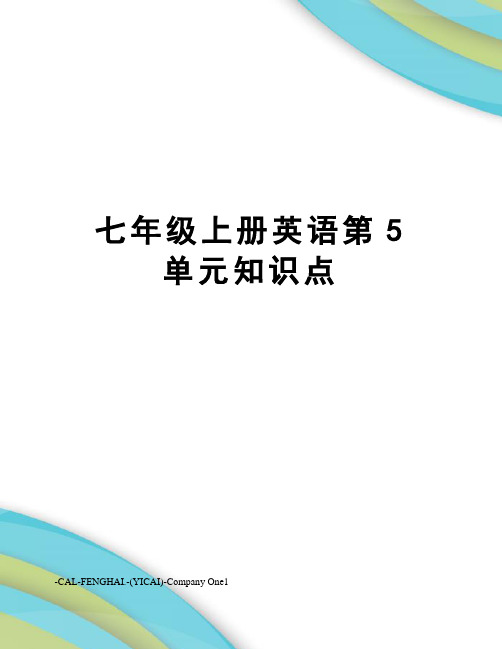2013七年级上Unit5单元知识点讲解
七年级上册unit5英语知识点汇总【DOC范文整理】

七年级上册unit5英语知识点汇总Unit5Doyouhaveasoccerball?词汇:球类名词小结soccerball英式足球ping-pongball乒乓球tennis网球volleyball排球basetball篮球“球拍”的表达tennisracet网球拍ping-pongbat乒乓球拍play+名词结构的短语playsports参加体育运动playputergaes玩电脑游戏“play+球类名词”结构的短语playping-pongball打乒乓球playtennis打网球playsoccer踢足球playvolleyball打排球sportsclub运动俱乐部 6.firstnae名lastnae=failynae姓atchTV看电视onTV在电视上,通过电视常用的描述某物或某事的形容词:interesting有趣的fun有趣的relaxing轻松的boring无聊的difficult困难的9.haveagreatsportscollection有大量的体育收藏品10.everyday每天句型:DoyouhaveaTV?yes,Ido/No,Idon’t.Dotheyhaveaputer?yes,theydo./No,theydon’t.Doeshehaveatennisracet?yes,hedoes./No,hedoesn’t.Doesshehaveasoccerball?yes,shedoes./No,shedoesn’t.Doeshehaveaping-pangball?yes,hedoes./No,hedoesn’t.Let’splaysoccer.Letehelpyou.Idon’thaveasoccerball.Thatsoundsgood.语法:1,句中不含be动词的一般疑问句的变法。
也就是说句中谓语动词是实义动词时,要变为一般疑问句,在句首加do/does,人称变第二人称,动词变原形其他的语序不变。
人教版七年级上册英语知识点全第五单元unit5知识点

Unit 5谈论物品所属关系。
1、重点辞汇:do、have、tennis、ping-pong bat、soccer、volleyball、basketball、play、interesting、boring、fun、difficult、relaxing、watch、same...2、soccer ball(英式)足球 a tennis bat一个网球拍baseball bat 棒球拍be late 迟到watch TV 看电视on TV 在电视上play basketball 打篮球play sports 做运动或参加体育比赛3、含有实意动词的一般疑问句的结构及答语。
---Do you /they have a...? e.g. Do they have a basketball?---Yes,I/they do./No,I/they don’t.---Does he /she have a...? e.g. Does she have a new schoolbag?---Yes,he/she does./No,he/she doesn’t.( )----Do you have lunch at home?----___________.A. Yes, I amB. Yes, I canC. Yes, I doD. Yes, I have4、tennis 和tennis ball的区别:tennis指运动项目名称,即“网球运动”。
tennis ball 则指具体的球,有单、复数之分。
e.g. a tennis ball/some tennis balls五、一般此刻时中have的用法和与there be 句型的辨析;have “有”即某物属于某人,表示所属关系,三单形式为has.e.g. I have a blue jacket and my sister has a yellow one.there be “有”主要指的是某地存在某物。
最全面人教版七年级上册英语第五单元知识点归纳总结

Unit 5 Do you have a soccer ball?一、词汇与短语● 重点单词A部分1.have v. 有2.has v. (have的第三人称单数形式)有3.ball n. 球te adj. 迟到5.ping-pong n. 乒乓球6.tennis n. 网球7.soccer n. (英式)足球8.get v. 去取(或带来);得到9.volleyball n. 排球10.great adj. 美妙的;伟大的11.basketball n. 篮球12.play v. 参加(比赛或运动);玩耍13.let v. 允许;让14.sound v. 听起来好像 pron. (we的宾格)我们16.bat n. 球棒;球拍17.go v. 去;走18.hey interj. 嘿;喂19.we pron. 我们20.do (第三人称单数形式does)aux v.&v.用于构成否定句和疑问句;做;干B部分1.interesting adj. 有趣的2.boring adj. 没趣的;令人厌倦的3.fun adj.有趣的;使人快乐的n. 乐趣;快乐4.difficult adj. 困难的5.relaxing adj. 轻松的;令人放松的6.watch v. 注视;观看 n.(= television)电视;电视机8.same adj. 相同的9.love v.&n. 爱;喜爱10.sport n. 体育运动11.with prep. 和……在一起;带有;使用12.only adv. 只;仅13.them pron. (they的宾格) 他(她、它)们14.like v. 喜欢;喜爱15.easy adj. 容易的;不费力的16.after prep.&conj. 在……以后17.class n. 班级;课18.classmate n. 同班同学● 重点短语A部分1.a ping-pong bat 一个乒乓球拍2.a baseball bat 一个棒球棒3.play basketball 打篮球4.sounds good 听起来不错5.be late 迟到6.play tennis 打网球7.play volleyball 打排球8.play soccer 踢足球9.play ping-pong 打乒乓球B部分1.play computer games 玩电脑游戏2.play volleyball 打排球3.go to the same school 上同一所学校4.watch TV 看电视5.sound interesting 听起来很有趣6.at school 在学校7.with them 和他们一起8.with our friends 和我们的朋友9.watch them on TV 在电视上看它们10.after class 下课后11.watch sports 看体育运动12.in the same school 在同一所学校13.play sth. with sb. 和某人玩某物14.love sports 喜爱运动● 重点句子A部分1.--Do you have a ping-pong bat? --No, I don't.你有一个乒乓球拍吗?不,我没有。
七年级英语上册Unit5Let’scelebrate重要知识点新版牛津版

Unit5 重要知识点1.Let’s celebrate.咱们庆祝一下吧。
celebrate (vi/vt)➡ celebration (n.)celebrate my birthday庆祝我的生日2.New Year’s Day元旦 Spring Festival春节 Thanks Giving Day感恩节 May Day五一劳动节 Children’s Day儿童节 National Day国庆节Mid-Autumn Festival中秋节 Teachers’ Day教师节3.dress up as... 装扮成...dress sb给某人穿衣dress oneselfbe dressed in+衣服=wear...=be in...4.wear vt.穿,戴强调穿着的状态in prep.强调穿着的状态put on 强调“穿,戴”的动作dress 作动词时,宾语通常为人The little child is too young to_______(穿衣)himself.5.as 介词“作为,当作” As a student,you should study hard.副词“如同;像...一样;按照” dress as... as usual像往常一样 as...as...像..一样... as if如果6.对“原因”提问:why 回答用:becausebecause of (doing) sth.因为(做)某事7.present n.礼物(可数)adj.现存的,目前的 at present目前8.at Christmas=on Christmas Day9.get together聚会,联欢together with... 和..一起10.enjoy the full moon 赏满月11.be full of...=be filled with... 充满,装满...full adj.吃饱了的 be full 反义词:be hungry12.thank you/thanks for doing sth 感谢做了某事13.the Mid-Autumn Festival中秋节14.wear masks戴面具15.paint our facespaint sth+颜色把..涂成...颜色paint (vt.)➡painting (n.)画16.make pumpkin lanterns制作南瓜灯笼make A out of B 用B制作Amake lanterns out of pumpkins17.be made of...(看得出原材料) be made from...(看不出原材料) be made in+产地产自.... be made by sb 由某人制成make up编造18.inside ①adv.在里面②在...里面➡反义词:outside19.knock on the door敲门20.shout at sb朝某人大喊21.trick or treat 不招待就使坏give sb sth as a treat给某人某物作为招待22.If they do not give us a treat,we(will)play a trick on them.If引导的条件状语从句:主将从现22.play a trick on sb/play tricks on sb开某人玩笑23.have a party开派对24.have lunch吃中饭 have a look看一下 have a seat坐下,就坐 have a meeting 开会have a happy holiday有一个愉快的假期25.on the evening of October 31在10月31号的晚上26.drink vt.喝 drink juice喝果汁n. drinks 饮料-What______(drink) do you like______(drink)?-I like______(drink) cola.27.special adj.特殊的➡specially adv.特殊地28.take notes记笔记29.question 要求回答的问题problem 有待解决的问题,习题 Maths problem30.特殊疑问句:特殊疑问词+一般疑问句?31.特殊疑问词:【what】”什么”➡是什么,叫什么,做什么可对主语,宾语,动作进行提问【when】“什么时候”询问时间,在询问具体时间,即“几点几分”,相当于“what time”【where】“在哪里”,用来询问地点,句中的不及物动词后不要加介词。
七年级上册英语第5单元知识点

七年级上册英语第5单元知识点-CAL-FENGHAI.-(YICAI)-Company One1Unit5 Do you have a soccer ball?话题:和朋友度过时光教学目标:1. 学会用have对物品的所属进行提问和回答2. 讨论自己喜欢和不喜欢的球类运动,说明原因3. 学会用Let's提建议重点:一般现在时态中have的用法难点:have的用法I have; He/She has…;Do you have a…Yes, I do. / No, I don't.Does he/she have… Yes, he/she does. / No, he/she doesn't.知识点:1.Do you have a ping-pang bat?这是一个一般现在时态的疑问句,have在句中是实义动词。
如果谓语是实义动词,变一般疑问句,常借助于助动词来提问,主语为第三人称单数借助does,其他情况均用do。
do 或does在这里没有实际的意义,仅仅用来帮助构成一般疑问句。
○谓语动词为实义动词的一般疑问句句型:Do/does+主语+动词原形Do you like bananas○陈述句变为一般疑问句的规律借调改加I like bananas. Do you like bananasHe likes bananas. Does he like bananas?She wants a book. Does she want a book?It likes apples. Does it like apples?○回答这种一般疑问句时,肯定Yes, 主语(代词)+do/does. 否定No,主语(代词)+do/does.---Do you know him?---Yes, I do./No, I don't.练习:1. ____ you have a pen Yes, I ____.2. ____they ____ apples No, they ____.3. ____he ____ a basketball Yes, he____.4. ____she ____ 2 books No, ____ ____.5. ____Amy ____ 5 eggs No,____ ____.6. ____Mike____ a baseball Yes,____ ____.7. ____ Peter ____ a tennis ____,he doesn't.8. ____ the boys ___ a volleyball ____,_____ do.9. ____ Jim and Alice ___ a computer No,____ _____.10.____ we ____ a soccer ball Yes,_____ ______.○have为及物动词,意为"拥有,有'第三人称单数形式为has.在它的后面加上某人或某物,表示"有……'。
新人教版七年级上册英语Unit 5知识点总结

新人教版七年级上册英语Unit 5知识点总结Unit 5 Fun Clubs一、课内短语归纳1. join school clubs 加入学校社团2. choose...from... 从……中选择….3. choose sb to be/as ...选某人当……..4. choose to do sth 选择做某事5. want to join 想要参加6. play Chinese chess 下中国象棋7. have a feeling of有……的感觉8. strong feelings 强烈的感情9. read with feeling有感情地朗读10. some good news 一些好消息11. start a music club 成立一个音乐社团12. musical instrument 乐器13. play a musical instrument 演奏一种乐器14. sing well 唱歌唱得好15. go to the music room 去音乐教室16. after school 放学后17. run fast 跑得快18. climb trees 爬树19. be good at 擅长...20. speak French 说法语21. tell stories 讲故事22. act out 表演23. at home 在家里24. be interested in对…感兴趣25. love doing sth 喜欢做某事26. learn to do sth 学习做某事27. cook for my family 为我的家人做饭28. more than 多于29. less than 少于30. keep ...in mind 记住…31. make up one's mind 下定决心32. change one's mind 改变某人的主意33. open one's mind 打开某人的思维34. fall in love with爱上…35. take photos /take a photo拍照36. learn from..从……学习37. at school 在学校38. share sth. with sb. 和某人分享...39. think up new ideas 想出新主意二、必背经典句1. Can you play Chinese chess? 你会下中国棋吗?2. — Can you read these words with feeling? 你能有感情地朗读这些文字吗?— Let me have a try. 让我试试吧。
七年级上册英语第五单元知识点总结
7A UNIT 5Visiting the Moon重点单词Diary 日记复数:diaries leave 离开,剩下,留下able adj. 能;能够space 太空,不可数spaceship 宇宙飞船spacesuit 宇航员Nervous adj. 紧张的gravity 重力float v.漂浮ourselves 我们自己的Without 缺乏,没有tie v.捆;系;绑tied, tied, tying breathe 呼吸if 如果camera 相机work v. 运转;运行garden 花园rock 岩石postcard n.明信片machine 机器Return 不及物动词,回来,返回=come back 及物动词,归还=give backweak 虚弱的,无力的he weak in he is weak in English.重点短语:leave for 动身去某地More than 超过,多余more···than 比···更be able to会,能have to 不得不so that 以便take photos 拍照as ···as on e can 尽某人所能As soon as possible 尽可能快地that is 也就是说Such as例如At the moment 现在,此刻(可用于现在时和过去时)重点句型:1.How far ···?2.···so that ··3.I’m going to···4.That’s a good idea.详细讲解:2.It’ll take us to the Moon.它将把我们带到月球。
(page59)It will take sb. Some time to do sth. 花费某人多收时间做某事一般现在时的结构:It takes sb. Some time to do sth.一般过去时的结构:It took sb. Some time to do sth.4.We’ll have to tie ourselves to our beds so that we won’t float away in our sleep!(page59)我们不得不把我们自己系在床上,以便我们睡着事不会漂走。
人教版英语七年级上册Unit5知识点总结
人教版英语七年级上册Unit 5 Do you have a soccer ball?.知识点梳理Section A课文要点全解1.tennis ball 网球辨析:tennis ball 与tennis以上两词都可表示“网球”,但意义却完全不同。
[拓展]本单元学到的表示球类运动的名词还有:Soccer(英式)足球volleyball 排球basketball 篮球Ping-pong 乒乓球baseball 棒球2.soccer ball (英式)足球soccer ball 意为“(英式)足球”。
I have a soccer ball. 我有一个足球。
[拓展]football 也可表示“足球”,在英式英语和美式英语中都有;football在美国指橄榄球,也称为American football。
football 是国际上对足球的普遍称呼,各种国际足球组织的官方称呼中也用football。
3.Do you have a ping-pong bat?你有一个乒乓球拍吗?(1)这是一般现在时的一般疑问句,句中的谓语动词have 是一个实义动词。
在英语中,句子的谓语动词如果是实义动词,变为一般疑问句时,要借助于助动词do/does来提问。
其基本句式为:Do/Does+主语+实义动词原型+其他?主语为第三人称单数时用Does,其他情况用do。
Do和does在这里没有实际意义,只是用来帮助构成一般疑问句。
I know Mr.Wang. 我认识王先生。
Do you know Mr.Wang? 你认识王先生吗?He has a baseball. 他有一个棒球。
Does he have a baseball? 他有一个棒球吗?[拓展]一般疑问句的肯定回答为“Yes, 主语(代词)+do/does.”,否定回答为“No, 主语(代词)+don’t/doesn’t.”。
-Does Tim go to school on foot? 蒂姆步行去上学吗?-Yes, he does./No, he doesn’t. 是的,他步行。
七年级上册英语正式篇第五单元知识点
Unit 5. Do you have a soccer ball语法专项一般现在时态中have的用法教材典句:1.Do you have a ping-pong bat Yes, I do .你有一个兵乓球吗?是的,我有。
2.Does he have a soccer ball 他有一个足球吗Yes, he does ./ No, he doesn’t . 是的,他有。
/ 不,他没有。
3.I don’t have a soccer ball ..... 我没有足球.....句1、句2是含有实义动词have的一般疑问句,句3是含有实义动词have的否认句。
下面让我们来学习一下have的具体用法吧!语法全解:1.用法:have意为“有〞表示所属关系,其主语一般是人,强调某人拥有某物,有时也可以用作主语。
一般现在时,当主语是第三人称单数形式时,谓语动词用has,其他人称时,谓语动词都用have。
People have their own hobbies. 人们都有自己的业余爱好。
Tom has three pens . 汤姆有3支钢笔。
助记:have的用法动词have表示“有〞位置就在主语后;“三单〞主语用has, 其他人称用have。
一般疑问句很好变,句首直接把do/ does 添;否认句子也容易,don’t/ doesn’t 加在have/ has前;does/ doesn’t 句中现,has要用have来替换。
2.句式⑴. 肯定句:主语+have/ has+......I have an eraser. 我有一块橡皮。
He has a soccer . 他有一个足球。
⑵. 否认句:主语+don’t/ doesn’t +have ......I don’t have an eraser. 我没有橡皮。
He doesn’t have a tennis racket . 他没有网球拍。
⑶. 一般疑问句:Do/ Does+主语+have....肯定答语:Yes, 主语+do/ does否认答语:No, 主语+don’t/ doesn’tDo you have a bike 你有自行车吗?Yes, I do. / No, I don’t . 是的,我有。
七年级英语上册Unit5Let’scelebrate知识点精讲(下)(新版)牛津版
by bike 骑自行车 by air /plane 乘飞机 by boat 乘船
by train 乘火车
by car
乘小汽车 by taxi 乘出租车
介词 on 的固定短语:
on foot 步行
“on/in +限定词+交通工具”,表交通工具的名词前必须加限定词。
on the bus 乘公共汽车 in her car 乘她的小汽车
9. Here is a poster for this year’s Chinese New Year celebrations in New York. 这儿是一张在纽约的今年春节庆祝活动的海报。 该句是倒装句,正常语序是:A poster for this year’s Chinese New Year celebrations in New York is
I need to find out more about night courses. 我需要了解夜校课程的更多情况。
辨析:find out
look for
find
find out
找出,发现,查出,了解 多指通过调查、查询、打听、研究之后“搞清楚,弄明白”,通
常含有“经过艰难曲折”的含义, 指找出比较难找到的、无形
by bus 介词短语,在句中作状语,表示行为的方式。
I go to school by bus. 我乘公共汽车去上学。
take a bus 动词短语,在句中作谓语。
I take a bus to school. 我坐公共汽车去上学。
4. Family members get together and give each other presents. 家人聚在一起,互送礼物。 present 可数名词,意为“礼物;礼品”。 Here is a Christmas present for you. 这儿有份圣诞礼物给你。 Miss Wang often gives presents to the children. 王小姐经常给孩子们礼物。
- 1、下载文档前请自行甄别文档内容的完整性,平台不提供额外的编辑、内容补充、找答案等附加服务。
- 2、"仅部分预览"的文档,不可在线预览部分如存在完整性等问题,可反馈申请退款(可完整预览的文档不适用该条件!)。
- 3、如文档侵犯您的权益,请联系客服反馈,我们会尽快为您处理(人工客服工作时间:9:00-18:30)。
Unit 5 重点单词和词组: 1. have (1)拥有,占有。主语可以指人,也可以指物,其第三人称单数形式为has。 I have a friend here. 我这儿有个朋友。 She has three dictionaries. 她有三本词典。 2. play与不同的词搭配表示不同的意思。 (1)在球类名词前不加冠词( a ; an ; the),表示玩耍,打/踢球。 play football 踢足球 play basketball/ table tennis 打篮球/乒乓球 (2)在乐器前加定冠词the, 表示弹/奏„„ play the piano/ guitar 弹钢琴/吉他 3. sound 听起来 是连系动词,它的后面跟名词、形容词或介词短语做表语。 That sounds interesting. 那听起来很有趣。 The story sounds boring. 这个故事听起来很乏味。 4. good, interesting, boring, difficult, fun, relaxing 这些形容词主要用在名词前面做定语或系动词后面做表语。 1)This is an interesting book. 这是一本有趣的书。 2)It’s difficult. 它很难。 形容词前还可以用副词来修饰。 This is a very interesting book. 这是一本很有趣的书。 It’s too difficult. 它太难了。 5. many, much, some 辨析 many “大量的,许多的”,修饰可数名词。 I have many friends. 我有许多朋友。 much “很多的,大量的”,修饰不可数名词。 There is much water in the bottle. 瓶子里有许多水。 some “一些”,既可以修饰可数名词; 又可以修饰不可数名词。 She has some apples and I have some milk. 她有一些苹果,我有一些水。 6. good, well 辨析 good 形容词,“好的”,可用在名词前修饰名词,充当定语;也可以用于系动词后,做表语。 Linda is a good girl. 琳达是个好女孩。 This book is very good. 这本书很好。 well (1)当形容词时,表身体好。 —How are you? —Very well, thanks. —你好吗? —我很好,谢谢。 (2)当副词时,用来修饰形容词,副词或动词,在句子中做状语。 He plays soccer well. 他踢球踢得很好。 7. and, but 辨析 and 连词,“和;又;而且”, 表示语气的并列或递进。 I can sing and dance. 我会唱歌和跳舞。 but 连词,“但是”表示语气的转折。 He can sing ,but he can’t dance. 他会唱歌但不会跳舞。 8. on TV 在电视上,通过电视 on the radio 通过无线电 I like watching football games on TV. 我喜欢在电视上看足球赛。 9. every day 每天,在句子中做状语。 I go to school every day. 我每天上学。 My father watches TV every day. 我父亲天天看电视。 everyday 形容词,“日常的”,只能做定语。 everyday life 日常生活 I speak everyday English every day. 我每天都说英语的日常交际用语。 10. play sports= do sports=have sports 做运动 sports club 体育俱乐部
二. 重要句型和重要表达法
1. Let’s play ping-pong. 我们打乒乓球 吧。 这是一个以动词let开头的祈使句。祈使句是“要求,命令别人做什么”的句子,一般情况下是“动词原形+其他”,主语省略。let sb. do sth. 意思是“让某人做某事”表示说话人的建议: Let me go. 让我走吧。 Let Lucy look at the picture. 让露西看看这幅画。 let’s =let us 表示“让我们„„吧”,后跟动词原形,用于提出建议或征求别人意见。 Let’s go! 我们走吧! Let’s go to school! 我们上学去吧! 其肯定回答:OK. /All right. /Yes, let’s…/That sounds… 否定回答:Sorry, I … 2. That sounds good. 那听起来不错。 sound 是系动词,意思是听起来,后面跟形容词作表语,构成系表结构。 The song sounds very nice. 这首歌听起来很动听。 系动词除了be以外还有look, get, feel, smell, become, turn. 系动词后加形容词、副词、名词或介词短语作表语。 (二)一般现在时态的含义 1. 表示现在的状态。 They are at table. 他们在用餐。 Jack is twelve. 杰克12岁了。 2. 表示经常的或习惯性的动作。 I go to school at seven in the morning. 我早晨7点去上学。 I watch TV every day. 我每天看电视。 3. 表示主语具备的性格和能力。 She likes fish very much. 她喜欢吃鱼。 We speak Chinese. 我们讲汉语。
(三)谓语动词的构成形式 1. 谓语动词是be的。 肯定式:I am… 否定式:I am not… You are … You are not… She/ He/ It is… She/He/It is not… They/ We are… They/We are not… 一般疑问句:1)Are you … 简略回答: Yes, I am/ We are. No, I am not /We aren’t. 2)Is he/ she/ it… Yes, he/she/ it is. No, he /she/ it isn’t. 3)Are they /we… Yes, they/ we are. No, they/ we aren’t. 2. 动词do 以have 为例 肯定句:I /We/ You/ They have friends. He/ She/ It has friends.(主语是第三人称单数用has .) 否定式:I /We /You /They don’t have friends. He /She/ It doesn’t have friends. 一般问句: Do you /we/ they have friends? Does she/ he/ it have friends? 简略回答: Yes, I /we /they/ you do. No, I /we /they /you don’t. Yes, she/ he/ it does. No, she/ he/ it doesn’t.
按要求完成下列句子 1. I have a volleyball. (改为否定句) I ___ ___ a volleyball.
2. His brother has a baseball.(改一般疑问句) ___his brother ___a baseball?
3.—Do your parents have a computer? (作出肯定回答) —Yes, ___ ___.
4.—Does Mary have a tennis racket? (作出否定回答) ____, ___ ___.
5.Lucy has two brothers. (变否定句) Lucy___ ___ two brothers.
一. 根据句意及汉语提示,用单词或词 组的正确形式填空。 1. The class _____(听起来有趣).
2.My cousin___(有) an English-Chinese dictionary.
3. Mike ____(没有) a sister. 4.Let’s ___(玩)computer games. 5. I ____(做运动) every day. 6.She _____(看电视) every evening. 二. 用所给单词的适当形式完成下列句子。 1.Tom ____(do not ) go to school today.
2.My uncle _____(have) a cat. 3.Let’s ___(play) football. 4.I can play basketball, but I can’t play it ____ (good).
